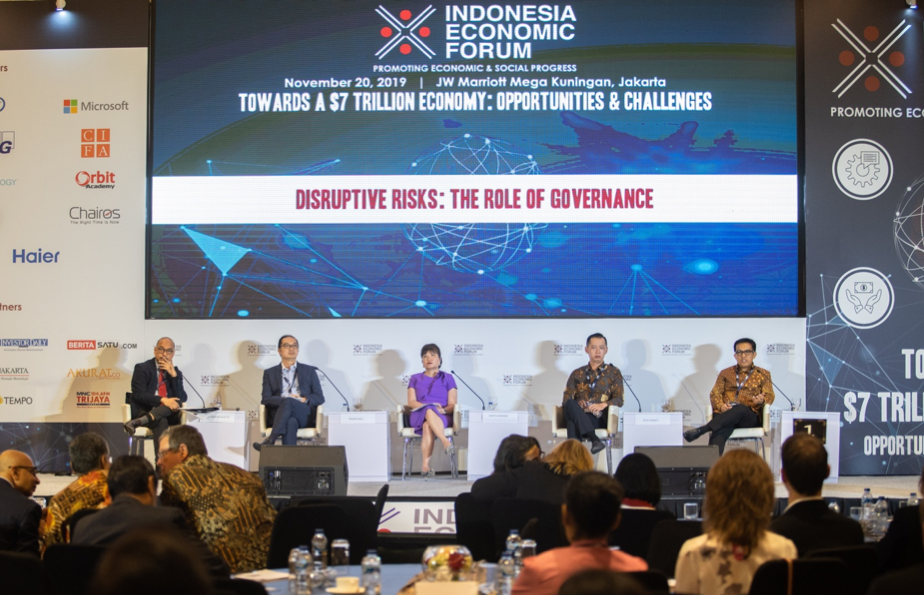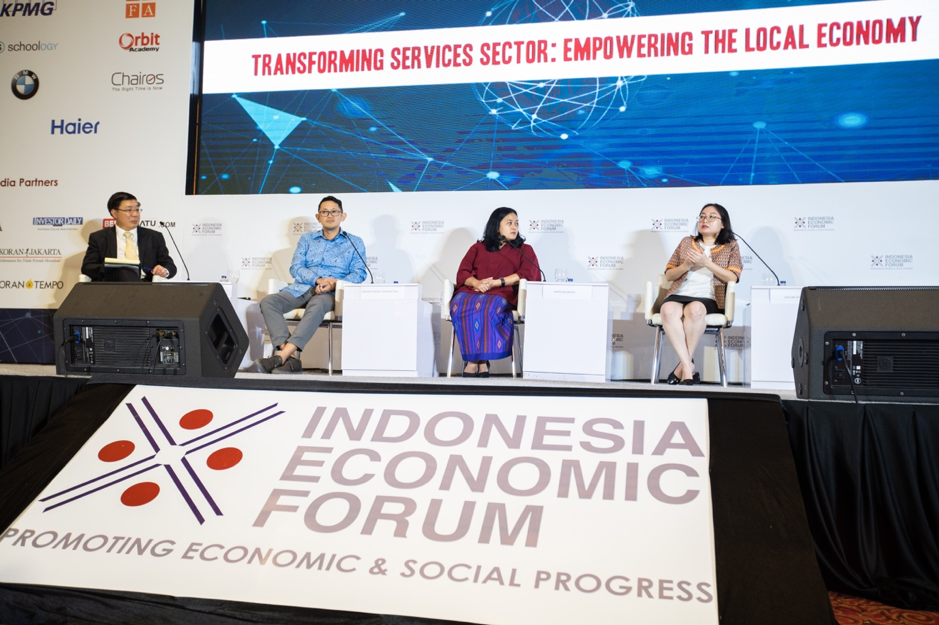6thAnnual Indonesia Economic Forum
Theme: Towards a $7 Trillion Economy: Opportunities and Challenges
Insights from global thought leaders at the 6thAnnual Indonesia Economic Forum 2019
In the past 5 years, there has been an acceleration of infrastructure development and attitude changes in terms of embracing technological disruptions. President Joko Widodo’s administration is now focusing on education and human capital to leapfrog and stay relevant in the midst of the fourth industrial revolution.
The 6thannual Indonesia Economic Forum (IEF), a multi-stakeholder platform, aims to bring these relevant issues to the forefront by inviting global thought leaders, business communities, entrepreneurs, senior government officials, chief executive officers of large corporations, and civil society to discuss challenges and strategize the way forward for Indonesia’s economy.
A similar notion across IEF panels is growth opportunities in the services sector and its obstacles. Both the second panel, Disruptive Risks: The Role of Governance, and the third panel, Transforming Services Sector: Empowering the Local Economy shared that a substantial contribution of the digital economy will come from the services sector, therefore, attention to tax incentives, local all-electric vehicle (EV) dealerships, and infrastructure development and its budget are paramount in the next decade.
The government’s role in assisting the private sector in such challenges will be significant in adopting a higher contribution of the services sector.
The Private Sector

The second panel, Disruptive Risks: The Role of Governance, mentioned that the services sector will play a substantial role in the digital economy. The government should provide the right climate for the private sector through clear policies and a clear mandate. Ms. Shinta Kamdani,Vice Chairman Kadin noted that though the objective is clear, the government continues to be boggled by the implementation and execution process, thus unable to execute relevant policies, for instance, expanding IT-related regulations on startup companies. She made other suggestions such as tax incentives for companies to buy new technology and for the research and development (RND) department. She continued that education and human capital are also important factors.
Both Ms. Kamdani and Mr. Irwan Djaja, President Director, KPMG Siddharta Advisory stressed the need for a clear mandate and a monitoring framework for the services sector.

The third panel, Transforming Services Sector: Empowering The Local Economy, provided a precedent with, BlueBird, one of the pioneering and paramount transportation providers of the country, embracing technological disruptions. Transportation infrastructure is a crucial aspect in not only the services sector but the movement of people and goods. Mr. Adrianto Andre Djokosoetono, BlueBird Director and speaker for the third panel recalled how they adopted, at the time, new technologies such as radio and air-conditioning into their car systems. These disruptions are seen as a positive influence and strengthened the need to adopt and update vehicles with new innovations, for instance, Bluebird has launched their first all-electric vehicle (EV) fleet, and is expanding to travel and tourism services. Some challenges are the lack of EV dealerships in Indonesia, and unreliant public charging facilities for BlueBird vehicles need to improve.
The development of transportation infrastructure is another aspect that needs to be improved. Ms. Adelina Halim, Director, Deloitte Indonesia, and speaker of the third panel noted the quick infrastructure development in the past 5 years with toll roads, public transportations, and the upcoming LRT as a significant achievement. A concern is the limited infrastructure budget and future developments such as traffic management systems and bus rapid transit systems. The government must also assist Indonesia’s transition from a conventional to a uni-centric integrated transportation service.
Technological Disruptions
The government’s attitude towards technological disruptions has shifted in the past 5 to 6 years. Ms. Shinto Nugroho, Chief of Policy and Government Relations, Gojek and speaker in the third panel applauded the improvement in the government’s attitude on embracing technological innovations. She mentioned that Gojek is a technology company meeting supply and demand since 2010 and had experienced their attitude then. Today, their open-minded attitude extends towards all sectors beyond transportation.
New technologies would lead to a demand in new jobs, and new regulations. Ms. Kamdani also expressed the need to shift focus on human capital development and education. Expansion of IT related regulations for startups is also imperative to liberalise to attract international partners and investors. Ms. Halim agreed that though automation of vehicles new job demand in traffic control, data and weather analytics, as well as the need for mechanical engineers. She also mentioned that with the current E-commerce rate, the market will quadruple by 2025.

